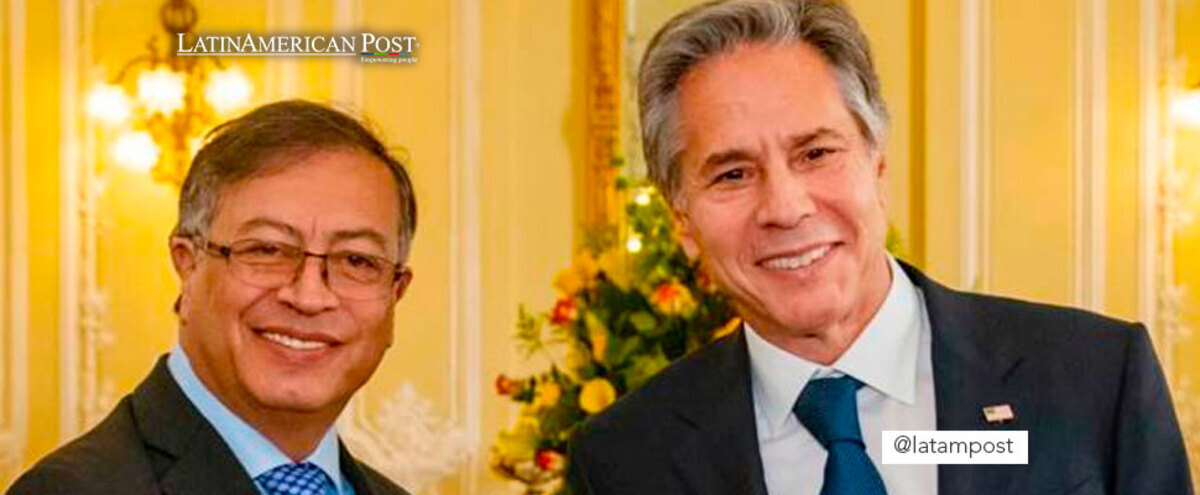In a meeting that took place in Bogotá, the Colombian president and the US Secretary of State spoke about important issues for both countries and the positions of each government regarding them .

Photo: TW-petrogustavo
LatinAmerican Post | Christopher Ramírez
Listen to this article
Leer en español: ¿Cómo fue la conversación entre Gustavo Petro y Antony Blinken y a qué acuerdos llegaron?
On October 3, Colombian President Gustavo Petro received the Secretary of State of the United States, Antony Blinken, at the Casa de Nariño (seat of the Government), in Bogotá, in order to discuss several critical issues in the relationship between both countries such as drug trafficking, extradition and the environment.
For over two and a half hours, the president and the highest representative of the North American country in the international arena sat down, in the presence of Vice President Francia Márquez and Colombian Foreign Minister Álvaro Leyva, not only to talk about this type of problem that today largely affects the South American country, but also to reach early agreements that can provide a clear solution to them.
What were the agreements?
In the conversation, the fight against drugs was undoubtedly the most important issue and both Petro and Blinken spoke about their proposals for it, with the Colombian president explaining, according to him, how this fight should be undertaken, who are criminals and who are not and, of course, on whom should fall the full weight of this scourge that claims dozens of lives every year in the South American country.
According to Petro, contrary to how right-wing governments had previously approached the fight against drugs hand in hand with the United States, this time it should be done "from another, more flexible perspective", with "a more comprehensive vision of the problem of drug consumption and production".
Thus, for example, for the president it is necessary that, both in his country and abroad, they stop "seeing the coca leaf producer as a criminal" and start "persecuting the owners of drug trafficking" through "intelligence devices capable" of finding the whereabouts of these leaders.
It may interest you: Colombia and Venezuela: What Are the Non-economic Benefits of Opening The Border?
In fact, Petro was even more blunt in stating that it is most likely that these characters do not even "dress in camouflage (…) perhaps they do not carry a rifle, and possibly they have been in these halls of the Palacio de Nariño, as they have been in the whole of the Political Power of Colombia and perhaps today in other political powers outside of Colombia”.
In response, as US President Joe Biden demonstrated a few weeks ago, Blinken said he “strongly supported the holistic approach President Petro is taking through justice, development, environmental protection, supply reduction, of demand".
“We are investing in the prevention of those who have addictions in our countries and elsewhere. To reduce the harm of illicit drugs and to reduce the demand, in particular from the United States, which gives rise to so much criminal activity. It is the comprehensive approach that defines our alliance through each of the shared priorities,” he added.
However, another of the issues that were discussed and on which there was no clear agreement between both countries, was that of extradition. While Petro defends tooth and nail his 'Total Peace' project, in which he offers guarantees of non-extradition to members of illegal groups who decide to avail themselves of Colombian justice, give his version of the truth and promise not to commit crimes again, Blinken assured, reluctantly, that he respects Colombian sovereignty, but that it is still an issue that his country will continue to handle as it has done until now.
Regarding the issue, Kristina Rosales Kostrukova, spokeswoman in Spanish for the State Department, was more emphatic in clarifying that in the US “We still maintain our extradition process, it has not changed at all. It is an important tool to dismantle the largest transnational criminal organizations.”
Finally, the issue of Venezuelan migration was also widely discussed at this meeting, taking into account that it is a situation that not only affects Colombia and the United States, but also most of the countries in the region.
On this, Blinken expressed his full support for the social and political processes with which the Colombian Government has been addressing the entry of Venezuelan citizens into its territory, making special mention of the policy known as the Temporary Protection Statute for Venezuelan Migrants (ETP). ), which was considered by the North American diplomat as “a model for the region”.
However, for Blinken, without mentioning Nicolás Maduro, it is extremely important and necessary for Venezuela to be able to return to democracy, making it clear that for the United States that country is still under a political, economic and social regime.
Doubtful support?
However, all these agreements, support and other commitments that have been reached, both by Blinken and Biden with Colombia, could remain in political limbo, depending on the results that will be given on November 8 after the midterm elections in the US. That day, Americans will go to the polls to elect their new representatives to the Chamber and 33 or 34 senators, as well as 34 of the 50 governors of the country.
What seems like a normal legislative election, the truth is that it could turn into a referendum on Biden and how his government should approach his administration, as assumed by 46% of the voters who participated in a survey related to this situation.
In the research, developed by Ramussen Reports, 50% of those surveyed say that if the Republicans stay with the majorities in Congress, "Biden should change course", which, of course, would also mean changing their environmental commitment with Colombia.
Thus, faced with this situation, it is not unreasonable to ask: will the midterm elections in the United States be a blow to the Colombian government's international strategy with that country?




